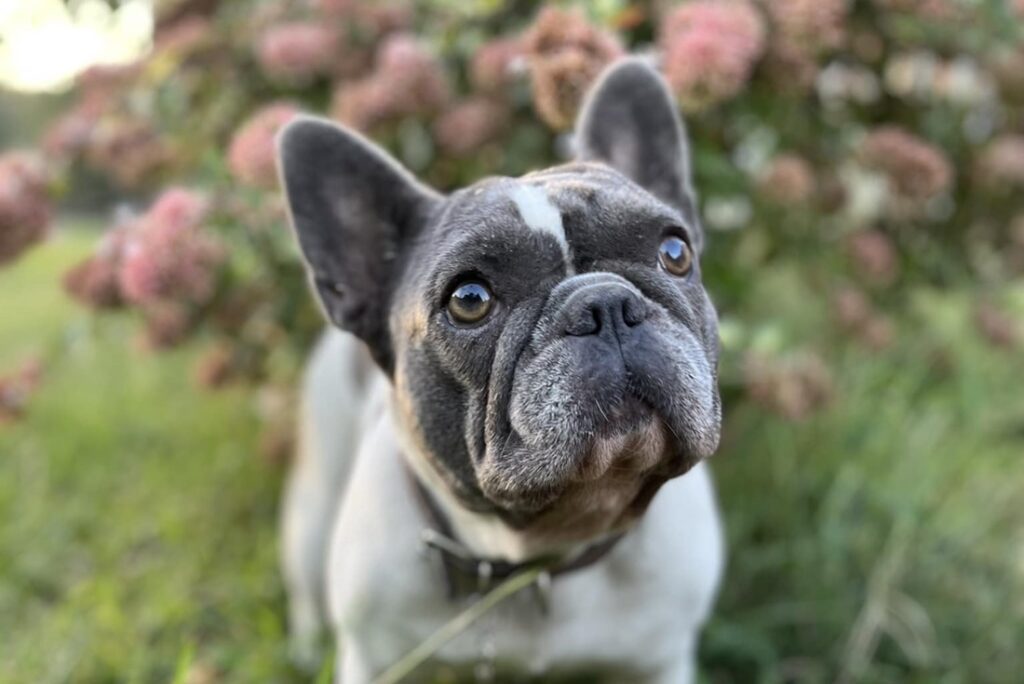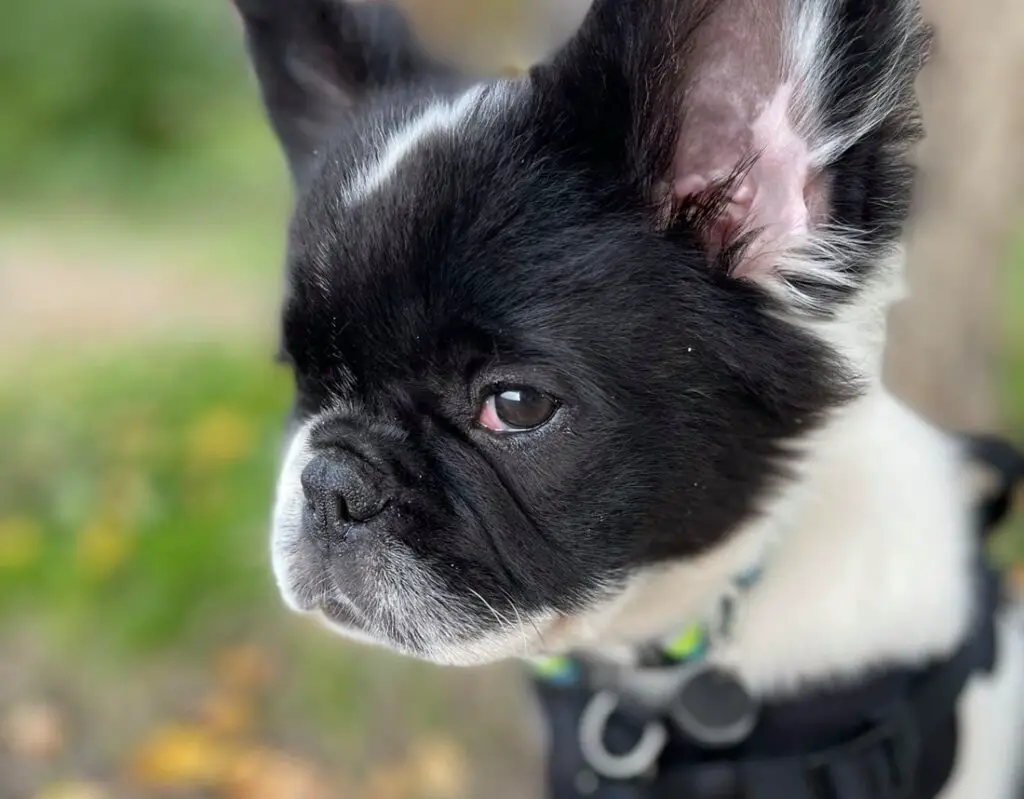Are you wondering why your French bulldog won’t touch their food?
Over the years I’ve seen so many owners struggle with getting their Frenchie to eat and it can be really frustrating.
Sometimes, there are medical issues behind their refusal to eat. However, often it is just the fact that they don’t like the food.
So, stay tuned and learn how to distinguish a picky French bulldog and one that is too sick to eat.
- Key Takeaway
- Understanding Your Frenchie’s Eating Habits
- Why French Bulldog Won’t Eat
- How To Encourage a French Bulldog To Start Eating
- The Importance of Adjusting Your Frenchie Diet According To Season
- Tips For Frenchie Picky Eating
- Safe and Healthy Treats For French Bulldogs
- When To Seek Veterinary Assistance For a Frenchie Not Eating
- FAQs
- Q: What should I do if my French Bulldog puppy is not eating?
- Q: Should I be concerned if my French Bulldog puppy is not eating?
- Q: What if my French Bulldog refuses to eat their main meals?
- Q: Is it normal for a French Bulldog to go without eating for a day?
- Q: What type of food should I feed my French Bulldog?
- Q: What should I do if my French Bulldog won’t eat?
- Conclusion and final thoughts
Key Takeaway
- Understanding your Frenchie’s eating habits involves observing their daily food intake, noting any changes in their appetite or behavior around mealtime, and gauging their reaction to different types of food and feeding schedules.
- A French Bulldog might not eat due to a variety of reasons ranging from health issues, stress or anxiety, changes in their environment, or simply being picky about their food.
- Encouraging a French Bulldog to start eating can be achieved by providing them with a variety of high-quality, nutritious foods, maintaining a consistent feeding schedule, and creating a calm and comfortable eating environment.
- Adjusting your Frenchie’s diet according to the season is important as it helps to meet their changing nutritional needs, considering factors like temperature changes, activity levels, and potential seasonal allergies.
Understanding Your Frenchie’s Eating Habits

Understanding your Frenchie’s eating habits involves observing their daily food intake, noting any changes in appetite, and being aware of factors that can influence their eating behavior.
French Bulldogs, affectionately known as “Frenchies,” have unique dietary needs compared to other breeds. They are prone to certain health issues like obesity and allergies, which can be managed with a proper diet.
It’s also important to remember that every Frenchie is an individual, so their eating habits may vary based on their age, health status, and personal preferences.
From my experience as a vet, I’ve observed that Frenchies are quite food-driven. They’re known for their hearty appetites and can be prone to overeating if given the chance. This makes portion control and regular meal times crucial for this breed to maintain a healthy weight.
Additionally, Frenchies can be sensitive to changes in their diet. A sudden switch in food brands or types can lead to digestive upset or refusal to eat. If a diet change is necessary, it’s best done gradually over a week or so, mixing in increasing amounts of the new food with the old to help your Frenchie adjust.
It’s also common for Frenchies to experience fluctuations in appetite due to various factors such as stress, illness, or medication side effects.
Why French Bulldog Won’t Eat

Several factors can contribute to a French Bulldog not eating, including anxiety, dental issues, illness, medication side effects, aging, changes in food, overfeeding on snacks, access to food from other sources, and serious health problems.
Anxiety or Stress
Anxiety or stress in dogs can manifest in several ways, including loss of appetite. A French Bulldog might be feeling anxious or stressed due to changes in its environment, the addition of a new family member, or even alterations in its daily routine.
Dogs are creatures of habit and any significant change can cause them to feel stressed. This stress can result in behavioral changes, one of which is reduced food intake.
In such cases, providing a safe and secure environment, maintaining a consistent routine, and using positive reinforcement techniques can help alleviate their anxiety and promote regular eating habits.
Dental or Mouth Problems
Dental or mouth problems such as tooth decay, gum disease, or oral injuries can cause significant discomfort for your French Bulldog, making the act of eating painful.
They may refuse to eat, particularly hard foods, and show signs of discomfort like pawing at the mouth, drooling, or even aggression when the mouth area is touched. Regular dental check-ups with a veterinarian can help detect these issues early and ensure appropriate treatment to alleviate pain and restore normal eating habits.
Upset Stomach and Illnesses
Just like humans, dogs can also experience an upset stomach or other short-term illnesses that lead to a loss of appetite. If your French Bulldog has contracted a virus or eaten something they shouldn’t have, they may experience symptoms such as vomiting, diarrhea, lethargy, and decreased appetite.
It’s crucial during these times to keep them hydrated and monitor their condition. If symptoms persist, a visit to the veterinarian is necessary to identify the cause and provide appropriate treatment.
Medications and Vaccinations
Some medications or vaccinations can cause temporary side effects like nausea or a general feeling of malaise in your French Bulldog, leading to decreased food intake.
These side effects are usually temporary, but it’s important to monitor your dog’s reaction to new medications or vaccines. If loss of appetite persists despite medication, it’s advisable to consult with your veterinarian for possible alternatives or solutions.
Aging and Appetite Changes
As French Bulldogs age, their metabolic rate slows down, and they may not be as active as they once were, leading to decreased food intake. Additionally, older dogs may experience health issues such as arthritis or dental problems that can make eating uncomfortable.
Regular vet check-ups are important during this life stage to manage any emerging health issues and adjust their diet as necessary to maintain optimal health.
Food or Brand Changes
French Bulldogs, like many dogs, can be particular about their food. A sudden change in their diet or brand of food can result in them refusing to eat.
Transitioning gradually from the old food to the new one over a week or so can help mitigate this issue. Starting with a mix of 75% old food and 25% new food, and gradually increasing the proportion of new food can help your dog adjust to the change.
Overfeeding on Snacks
If your French Bulldog is being given too many treats or human food, they might not feel hungry when it comes time for their regular meals.
This can lead to nutritional imbalances as treats and human food may not provide all the nutrients required by your dog. It’s important to ensure that treats constitute no more than 10% of your dog’s daily caloric intake to maintain a balanced diet.
Getting Food from Elsewhere
If your French Bulldog has access to other food sources, they might not feel the need to eat their own food.
This could be a neighbor who regularly feeds them or unsecured trash bins they have learned to rummage through. Ensuring your dog does not have access to these alternative food sources can help restore their appetite for their own, nutritionally balanced food.
Serious Health Issues
Loss of appetite is often one of the first signs of serious health issues in dogs.
Conditions such as kidney disease, cancer, or heart disease can cause your French Bulldog to lose their appetite. Regular vet check-ups can help detect these conditions early.
If your dog is persistently refusing to eat, it’s important to get them checked by a veterinarian to rule out any serious health issues and provide necessary treatment.
How Much Food Should a French Bulldog Eat According To Age
| Age of French Bulldog | Amount of Food |
|---|---|
| 2-3 months | 1.5 – 2 cups/day divided into 4 meals |
| 4-5 months | 2 – 2.5 cups/day divided into 3 meals |
| 6-9 months | 2 – 2.5 cups/day divided into 2 meals |
| 10-12 months | 1.5 – 2 cups/day divided into 2 meals |
| Adult (1 year and above) | 1.5 – 2 cups/day divided into 2 meals |
French Bulldogs, like all dog breeds, have specific dietary requirements that change as they grow and age.
For puppies aged between 2-3 months, it’s recommended that they consume around 1.5 to 2 cups of food per day, divided into four meals.
As they grow a bit older, between 4-5 months, their intake should be increased to about 2 to 2.5 cups per day, but this time divided into three meals.
When they reach the 6-9 months bracket, the amount remains the same, however, the frequency is reduced to two meals a day.
The same feeding frequency continues for French Bulldogs aged 10-12 months, but the total daily intake should be reduced back down to about 1.5 to 2 cups.
Once they hit adulthood, which is typically at one year old, maintaining a steady diet of 1.5 to 2 cups of food per day over two meals is advisable.
How Long Can a Frenchie Go Without Eating?

A healthy French Bulldog can typically go without eating for about 24 to 48 hours before it becomes a serious concern.
While individual circumstances may vary, most French Bulldogs can withstand a short period of fasting, but going without food for more than one or two days can lead to serious health complications.
Their small size and fast metabolism mean they burn energy quickly and need regular meals to maintain their energy levels. Moreover, prolonged fasting can lead to hypoglycemia, particularly in puppies, which can be life-threatening if not addressed promptly.
From my experience as a vet, I’ve seen many cases where a Frenchie has refused to eat due to stress, illness, or changes in diet. In such instances, it’s important to identify and address the underlying cause rather than just focusing on getting them to eat.
If your Frenchie refuses to eat for more than a day, it’s always a good idea to consult with a vet to rule out any potential health issues.
How To Encourage a French Bulldog To Start Eating

Encouraging a French Bulldog to start eating involves implementing strategies such as reducing treat intake, adding flavor to meals, using slow feeder bowls, and monitoring their overall health.
Reducing Treat Intake
One of the first steps to get a Frenchie to start eating their main meals is to cut back on treats and scraps between meals.
Like children, if Frenchies eat too many treats, they may lose interest in their essential meals. This not only affects their appetite but could lead to nutritional deficiencies.
Adding Flavor to Meals
Another effective method to encourage your Frenchie to eat is by adding flavor to their meals. This could involve adding a bit of warm water to dry kibble or soaking the kibble in warm water.
Additionally, adding a couple tablespoons of no salt chicken or beef broth, or a dollop of non-fat plain yogurt can enhance the flavor and make the food more appealing to your Frenchie.
Using Slow Feeder Bowls
Using a slow feeder bowl can also be beneficial. These bowls are designed with ridges or mazes that the dog has to work around to get their food, which slows down their eating.
This can prevent them from eating too quickly and help them feel fuller, which could encourage them to eat more at meal times.
Monitoring Health
Lastly, it’s important to monitor your Frenchie’s health. Refusing to eat can sometimes indicate a more serious health issue. If you notice any other symptoms like lethargy, vomiting, or changes in stool along with a lack of appetite, a visit to the vet is recommended.
From my experience as a vet, I’ve found that these strategies can be quite effective in dealing with a Frenchie’s reluctance to eat.
However, it’s important to remember that each dog is an individual and what works for one might not work for another. So, a bit of patience and trial and error may be required to find the best approach for your Frenchie.
The Importance of Adjusting Your Frenchie Diet According To Season

Adjusting your Frenchie’s diet according to the season is important as it helps ensure they receive the right nutrients and energy levels for their seasonal activities and health needs.
Adjusting Diet for Increased Activity in Warmer Months
In the warmer months, French Bulldogs often have more energy and are more active. This increase in physical activity can result in higher energy consumption.
As such, it may be necessary to slightly increase their food intake to compensate for this increased energy expenditure.
However, it’s important to do this carefully and not overfeed them, as French Bulldogs are prone to obesity. Overfeeding them could lead to weight gain and other health issues.
Importance of Hydration in Summer
During the hot summer months, hydration becomes even more crucial for your Frenchie’s health. The heat can easily cause your dog to become dehydrated, which can lead to serious health problems.
While water should always be readily available, you can also add water-rich foods to their diet during this time. Foods like cucumbers, watermelon (make sure it’s seedless), and apples can help keep your Frenchie hydrated by providing additional water content.
Adapting to Reduced Activity in Colder Months
When the weather gets colder, your Frenchie might be less active. This decrease in physical activity means they will burn fewer calories, so you might need to reduce their food intake to prevent weight gain.
At the same time, the dry winter air could affect their skin and coat. Including foods high in Omega-3 fatty acids, such as fish or flaxseeds, in their diet can help support skin and coat health during these dry months.
Boosting Immunity During Seasonal Changes
Changing seasons can sometimes affect your Frenchie’s immune system, making them more susceptible to illnesses.
To help boost their immune system, you could include foods rich in antioxidants in their diet. Foods like blueberries, spinach, and sweet potatoes are high in antioxidants and can help strengthen their immune system.
In my experience as a vet, I’ve found that adjusting a Frenchie’s diet according to the seasons can greatly improve their health and well-being.
However, it’s important to make any significant changes to their diet gradually and under the supervision of a vet to avoid upsetting their digestive system.
Always observe your Frenchie’s response to dietary changes and adjust accordingly to ensure they are getting the nutrients they need in each season.
Tips For Frenchie Picky Eating
Addressing Frenchie’s picky eating involves understanding your dog’s preferences, introducing variety and flavor to their diet, maintaining a consistent feeding schedule, and seeking veterinary advice when needed.
Adding Flavor and Variety
One of the key strategies for dealing with a picky Frenchie is to introduce variety and flavor into their meals. This can be as simple as adding a bit of warm water to their dry kibble, which can enhance the aroma and taste, making it more appealing.
Alternatively, consider adding fresh slices of fruits like apples to their diet. These not only improve their appetite but also provide additional nutrients.
Introducing New Foods Gradually
When introducing new foods to your Frenchie’s diet, it’s important to do it gradually. A sudden change can lead to refusal to eat or digestive upset.
Start by mixing a small amount of the new food with their current one, and then gradually increase the proportion over a week or so. This will help your Frenchie adjust to the taste and texture of the new food.
Trying Different Food Types
If your Frenchie is particularly picky, you might need to experiment with different types of food. Some Frenchies might prefer wet food over dry kibble, while others might find raw food more appealing.
Raw food, in particular, can be an excellent choice as it’s often more flavorful and closer to a dog’s natural diet.
Consistent Feeding Schedule
Maintaining a consistent feeding schedule is crucial. If your Frenchie knows when to expect their meals, they’re less likely to become overly picky.
It’s also important not to offer them alternatives if they refuse to eat their meal. If they learn that refusing food leads to being offered something tastier, they’re likely to continue the behavior.
Safe and Healthy Treats For French Bulldogs
Safe and healthy treats for French Bulldogs include a variety of fruits, vegetables, and specially formulated dog treats that are both nutritious and appealing to their taste buds.
Fruits and Vegetables
Many French Bulldogs enjoy the taste of fresh fruits and vegetables. Apples, bananas, carrots, cucumbers, and celery are all excellent choices.
These can be given as a healthy snack or used as a reward during training sessions. Always remember to remove any seeds from fruit and cut them into manageable sizes to prevent choking.
Special Formulated Dog Treats
There are many dog treats on the market that are perfect for French Bulldogs. Some of the best options include Blue Buffalo Bits, DreamBone DreamSticks, and American Journey Trail Bites.
These treats are not only tasty but also nutritionally balanced, making them an excellent supplement to your Frenchie’s diet.
Natural Chews
Natural chews such as Himalayan Cheese Sticks, Bully Sticks, and bones can be great for keeping your Frenchie entertained while also promoting dental health.
These treats are long-lasting and can help reduce plaque and tartar build-up on your Frenchie’s teeth.
Probiotic-Rich and Fiber-Filled Treats
Probiotic-rich cookies and fiber-filled bones can help support your Frenchie’s digestive health. Probiotics can help maintain a healthy balance of bacteria in the gut, while fiber can aid in digestion and help prevent constipation.
When To Seek Veterinary Assistance For a Frenchie Not Eating
Seeking veterinary assistance for a Frenchie that is not eating becomes necessary when the dog refuses to eat for more than 24 hours, shows changes in their normal eating habits, or exhibits other symptoms like lethargy, vomiting, or changes in the stool.
French Bulldogs are known for their hearty appetites, so any prolonged refusal to eat is cause for concern. It’s important to monitor your Frenchie’s eating habits and look out for any changes.
If your Frenchie skips a meal occasionally but otherwise appears healthy, it might not be a cause for immediate alarm. However, if they refuse to eat for more than 24 hours, it’s time to reach out to a vet.
Changes in your Frenchie’s regular eating habits can also be a sign of underlying health issues. This could be eating less than usual or showing less interest in food.
These changes can be due to various reasons – stress, dental issues, digestive problems, or even serious conditions like kidney disease or cancer.
In addition to changes in eating habits, other symptoms should prompt a visit to the vet. These include vomiting, changes in stool, lack of energy or lethargy, difficulty breathing, drinking excessively or too little, and poor balance.
These signs, especially when coupled with loss of appetite, can indicate serious health issues that need immediate attention.
FAQs
Q: What should I do if my French Bulldog puppy is not eating?
A: If your French Bulldog puppy is not eating, it’s important to monitor their behavior and appetite. Offer them small, frequent meals throughout the day and make sure they have access to fresh water. If the issue persists, it’s advisable to seek veterinary advice.
Q: Should I be concerned if my French Bulldog puppy is not eating?
A: If your French Bulldog puppy is not eating, it’s a cause for concern as puppies require proper nourishment for their growth and development. It’s advisable to consult your vet to identify the cause and ensure your puppy gets the necessary nutrition.
Q: What if my French Bulldog refuses to eat their main meals?
A: If your French Bulldog refuses to eat their main meals, it’s important to offer them nutritious snacks throughout the day to ensure they are getting enough calories and nutrients. Additionally, you should consult your vet to rule out any health issues.
Q: Is it normal for a French Bulldog to go without eating for a day?
A: While it’s not uncommon for French Bulldogs to occasionally skip a meal, going without eating for a day is a cause for concern. If your French Bulldog consistently refuses to eat, it’s advisable to consult your vet to identify the underlying cause.
Q: What type of food should I feed my French Bulldog?
A: When it comes to feeding your French Bulldog, it’s important to provide them with a balanced diet that meets their nutritional needs. You can choose between dry kibble food or wet food, depending on your dog’s preferences and any specific dietary requirements advised by your vet.
Q: What should I do if my French Bulldog won’t eat?
A: If your French Bulldog won’t eat, it’s important to consult your vet to rule out any underlying health issues. They may recommend a change in diet or perform necessary tests to identify the cause of the refusal to eat. It’s best to address the issue promptly for your dog’s well-being.
Conclusion and final thoughts
In conclusion, if you own a French Bulldog and are struggling to get them to eat, know that you are not alone.
It is common for this breed to have a unique eating habit that may seem concerning at first, but it is important to understand their specific needs and behaviors.
By providing the right food, creating a routine, and paying attention to any potential health issues, you can ensure that your French Bulldog is happy and healthy.





Leave a Reply